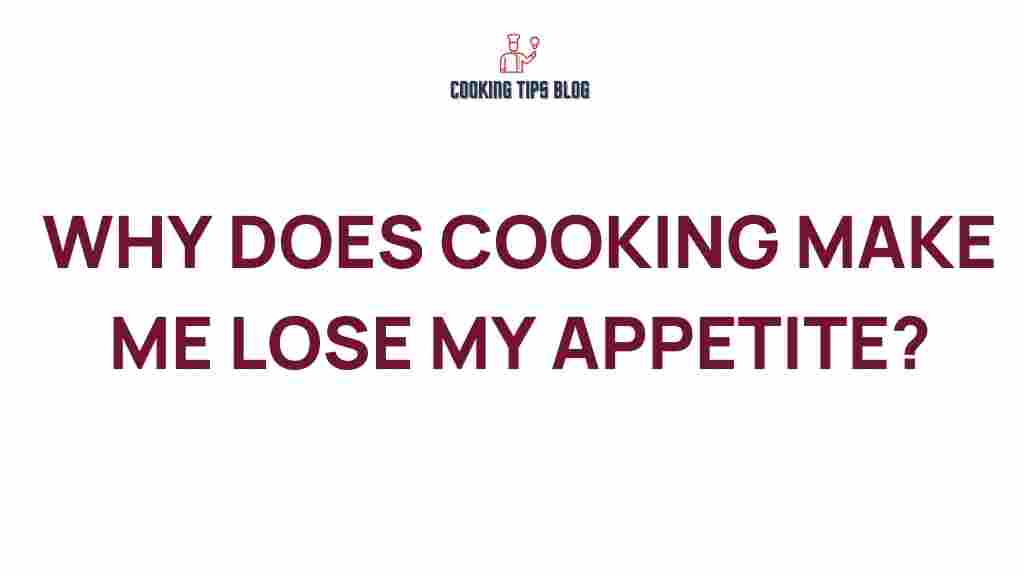Unraveling the Mystery: Why Does Cooking Make Us Lose Our Appetite?
Cooking is an essential part of our daily lives, serving not just as a means to prepare food but also as a ritual that connects us with culture and family. However, you may have noticed that after spending time in the kitchen, your appetite can sometimes diminish. This phenomenon may seem contradictory; after all, the aroma of delicious meals often fills the air! In this article, we will delve into the reasons why cooking can lead us to lose our appetite and explore various factors that influence this curious effect. By understanding these mechanics, we can better appreciate our relationship with food.
Understanding the Science Behind Cooking and Appetite
To grasp why cooking can make us lose our appetite, it’s essential to look at the biological and psychological factors involved.
- Smell and Taste: The act of cooking releases volatile compounds that create enticing aromas. While these scents usually stimulate hunger, they can also lead to satiety once we are exposed to them for extended periods.
- Visual Appeal: As we prepare food, our exposure to the visual aspects of cooking can sometimes saturate our senses, making the final meal less appealing.
- Physical Engagement: The act of cooking requires physical effort, which can lead to fatigue. This fatigue may translate into a reduced desire to eat.
The Role of Cooking Methods
The method of cooking can significantly influence how we perceive food and, consequently, our appetite. Different cooking methods can alter the texture and flavor of ingredients, which can either stimulate or suppress appetite.
- Boiling: Often considered a less flavorful method, boiling can lead to a bland taste that may not excite the appetite.
- Grilling: This method imparts a smoky flavor that many find appealing, potentially increasing hunger.
- Baking: The aroma of baked goods can be inviting, yet the time spent smelling them can lead to a sense of fullness before even tasting them.
Psychological Factors Influencing Appetite
Our psychological state plays a crucial role in appetite regulation. The act of cooking can impact our mental approach to food in various ways:
- Stress and Anxiety: For some, cooking can be a stressor, leading to anxiety that suppresses appetite.
- Mindful Cooking: Engaging fully in the cooking process can lead to mindfulness, which sometimes results in a reduced interest in eating due to a heightened awareness of our bodily sensations.
- Social Cues: Cooking for others can lead us to focus on their needs over our own, often leading to decreased personal appetite.
Step-by-Step Process: How Cooking Affects Our Appetite
To illustrate how cooking influences appetite, let’s break down the process into a step-by-step analysis:
- Preparation: Gathering ingredients and planning meals can create anticipation but may also lead to decision fatigue, which can dampen appetite.
- Cooking: The sensory experiences of cooking (smell, sight, and sound) can either stimulate hunger or create a sense of fullness.
- Serving: The presentation of the meal plays a significant role in its appeal. If we are too involved in the preparation, the meal may lose its allure.
- Tasting: The more we taste during the cooking process, the less hungry we may feel by the time the meal is ready.
Common Misconceptions About Cooking and Appetite
As we explore the relationship between cooking and appetite, it’s essential to address some common misconceptions:
- Cooking Always Increases Appetite: While it often does, the opposite can occur, especially if we become overly familiar with the food.
- Only Complex Dishes Affect Appetite: Even simple meals can lead to appetite suppression if the sensory experience is strong enough.
- Cooking for Others Means You’ll Want to Eat Too: This isn’t always the case. Focus on the needs of others can lead to neglecting our personal hunger cues.
Troubleshooting Tips: Regaining Your Appetite After Cooking
If you find that cooking often diminishes your appetite, here are some tips to help counteract this effect:
- Take Breaks: Step away from the kitchen for a few moments to reset your senses before enjoying the meal.
- Change Cooking Methods: Experiment with different cooking styles to see if they stimulate your appetite more effectively.
- Engage Your Senses: Try to appreciate the aroma and presentation of the food without overindulging in tasting during the cooking process.
- Cook with Others: Involve friends or family in the cooking process. Their enthusiasm may help rekindle your appetite.
Conclusion: Embracing the Complexity of Cooking and Appetite
Cooking is a multifaceted experience that goes beyond simply preparing food. While it can sometimes lead to a decrease in appetite due to various biological and psychological factors, understanding these influences can help us create a more balanced relationship with food. By acknowledging how our cooking practices and environments affect our appetite, we can make more conscious choices about our meals.
Whether you’re an experienced chef or a novice in the kitchen, remember that cooking is not just about feeding the body; it’s about nourishing the soul. As you continue to explore the art of cooking, pay attention to your appetite and the sensations that accompany the culinary journey.
For more information on enhancing your cooking skills, check out this comprehensive guide to culinary techniques.
If you are interested in understanding more about nutrition and appetite regulation, consider visiting this external resource on appetite control.
This article is in the category Healthy and created by Cookingtipsblog Team
